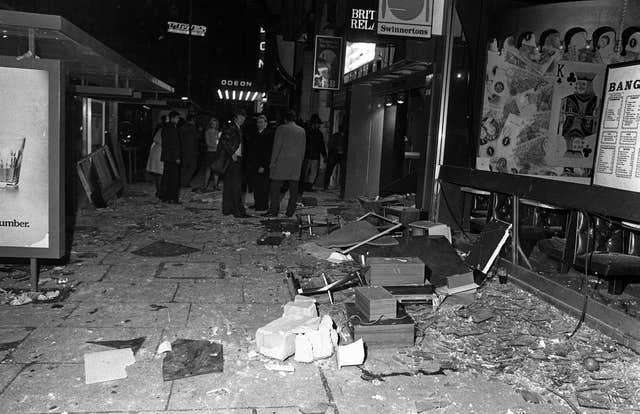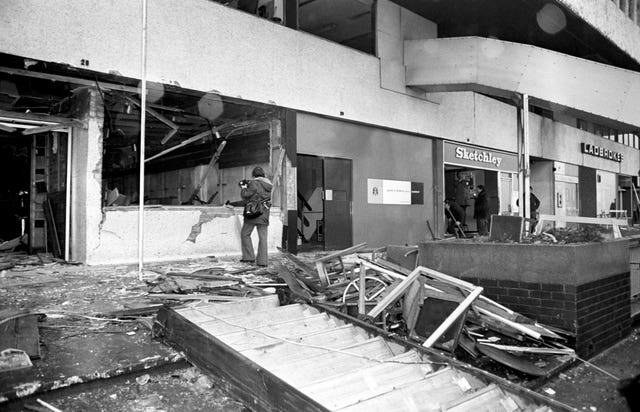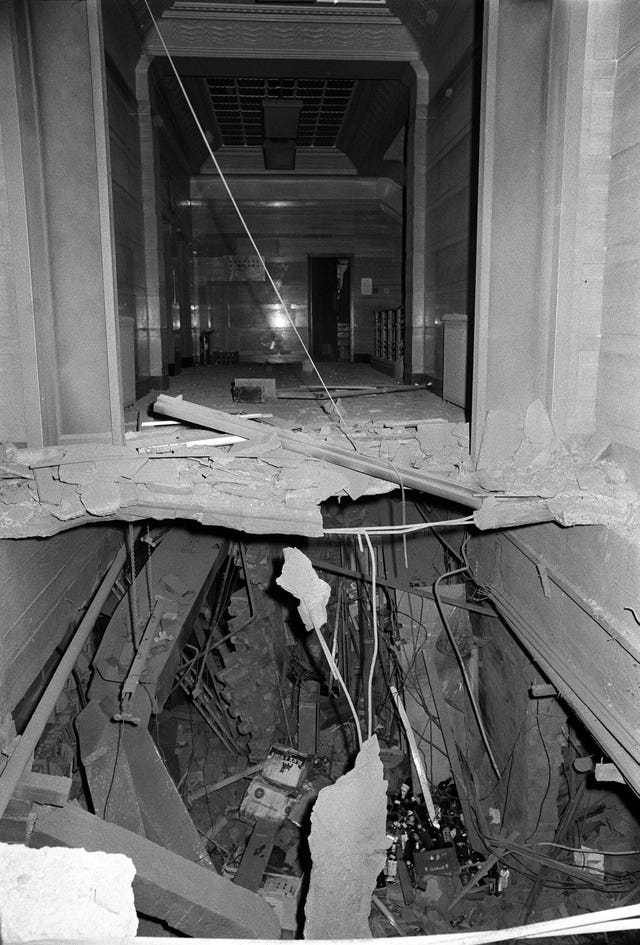Key events surrounding Birmingham pub bombings
21 people were killed in the bombings in 1974.

Here is a timeline of events related to the Birmingham pub bombings in 1974:
– November 14 1974: Bomber James McDade, 28, a lieutenant in the Birmingham IRA, is blown up planting explosives at the Coventry telephone exchange.
– November 21 1974: Fearing violent disorder between pro and anti-IRA factions, 1,600 West Midlands Police officers are deployed to Coventry and Birmingham airport for McDade’s funeral transportation to Belfast. It leaves just 15 officers on duty at Birmingham’s two city centre stations that night – among them just six uniformed constables.
– 8.11pm: Ian Cropper, a telephonist at the Birmingham Post and Mail, receives a call. A male Irish voice tells him: “There is a bomb planted in the Rotunda and there is a bomb in New Street… in the tax office. The code word is Double X”. The line goes dead and Mr Cropper calls the warning in to police.

– 8.14pm-8.18pm: Six officers arrive at the Rotunda. Some of their number then go inside the office block to begin searching the building, while two others run towards nearby New Street.
– 8.18pm-8.20pm: Two massive explosions rip apart the packed Tavern in the Town and Mulberry Bush pubs in Birmingham city centre, instantly killing 19 people, and wounding more than 220.
– 8.18pm: The first bomb, weighing between 25lb-30lb (11kg-14kg) goes off in the Mulberry Bush. It has been left next to a telephone by the bar. Leaving a metre-wide crater, it kills 10, including friends Paul Davies, 17, and youngest victim 16-year-old Neil “Tommy” Marsh, who happen to be outside the pub at the time.
– 8.20pm: A second bomb weighing 30lb (14kg) detonates in the Tavern in the Town, blasting a hole in the 10in concrete floor and a nearby basement wall. It is placed in an alcove, near a one-armed bandit games machine. One witness, stood near the bomb, describes hearing a “whirring sound” right before detonation.
– 8.23pm: A 999 call is passed to officers in the city centre sub-division at Digbeth police station, from a resident at nearby Stephenson Tower, reporting that a “bomb” has gone off at the Mulberry Bush.

– 8.33pm: 17 minutes after the first bomb, a police station radio operator reports back to the 999 call handlers that “resources sent… with times of involvement”. The pub bombings inquests are told none of these records, including the times messages were passed on, have been recovered. Force control memory tapes were wiped.
– 10.40pm: Five men are arrested after getting off a train travelling from Birmingham New Street railway station and detained at Heysham Harbour, Lancashire. Paddy Hill, Gerry Hunter, Richard McIlkenny, Billy Power and Johnny Walker, who will become five of the Birmingham Six, are taken to Morecambe police station for questioning.
– November 22 1974: Under questioning by West Midlands Police serious crime squad officers at Morecambe station, some of the men claim they are made to sign confessions. They undergo forensic tests by scientist Frank Skuse.
– 5am: A third unexploded IRA bomb is discovered behind Barclay’s Bank, Hagley Road, Birmingham, and destroyed in a controlled detonation. The remnants of the bomb are later lost by West Midlands Police.

– November 27 1974: Part-time barman Tom Chaytor, 28, a divorced father of two who took on a bar job at the Tavern in the Town three weeks before the bombing, dies of injuries sustained in the blast. He becomes the 20th victim of the blasts.
– November 28 1974: A coroner opens and adjourns inquests into the deaths. The hearings never take place, as they are overtaken by the criminal trial and subsequent convictions of the Birmingham Six.
– December 9 1974: James “Jimmy” Craig, 34, a fit amateur footballer and automotive factory worker, out on a date on the night of the bombings, becomes the 21st and final victim after succumbing to his injuries in hospital.
– August 15 1975: The Birmingham Six are convicted after trial of 21 counts of murder.

– April 2014: A cold case review of evidence by West Midlands Police, conducted between 2012 and 2014, concludes that of the 168 exhibits listed for trial in 1975, 35 had been lost – including the third bomb, found behind Barclays Bank.
– June 1 2016: Senior coroner for Birmingham and Solihull Louise Hunt rules that the original inquests should resume. Delivering her ruling, she said: “I am of the view that the evidence does now need to be heard publicly, so that a decision can be made based on evidence as to how these 21 people came by their deaths.”
– February 2019: Fresh inquests into the pub bombings begin.
– April 5 2019: More than 44 years after the bombings, the inquests into the deaths of the bereaved loved ones conclude the victims were unlawfully killed.
– October 19, 2020: Home Secretary Priti Patel announces she is to consider a statutory public inquiry into the circumstances of the bombings and wants to meet with the victims’ families.
– November 18, 2020: Days before the 46th anniversary of the bombings, West Midlands Police arrest a 65-year-old man in Belfast, Northern Ireland, in connection with the blasts. It is the first arrest in connection with the case in more than four decades.





